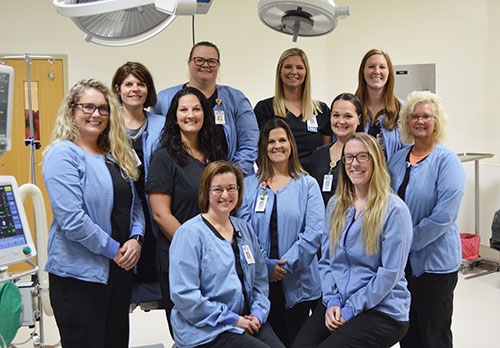You are here
Home ›March is Colorectal Cancer Awareness Month: Preventing colon cancer with colonoscopies

Veterans Memorial Hospital Surgery Nursing Staff ... During March, which is recognized as Colorectal Cancer Awareness Month, the surgical staff at Veterans Memorial Hospital emphasizes the importance of preventing colon cancer with colonoscopies. Colon cancer can be easily prevented, yet it remains the second leading cause of cancer deaths in the United States. Colonoscopies are performed routinely in the Veterans Memorial Hospital surgical suite. Pictured above is the hospital’s surgery nursing staff who help patients prepare and recover from this common, life-saving procedure. Submitted photo.
Colon cancer can be easily prevented, yet it remains the second leading cause of cancer deaths in the United States. Colon cancer screening tests identify suspicious or pre-cancerous polyps, which can be removed before they develop into a serious health problem.
There are four main testing options for detecting colon cancer: fecal occult blood test, flexible sigmoidoscopy, barium enema and colonoscopy. Colonoscopies, a very thorough colon cancer test, are performed routinely in the Veterans Memorial Hospital surgical suite with this equipment, and typically take just three hours from start to finish.
Both men and women are at risk for colon cancer. Personal risk varies, so a patient’s local medical practitioner can help them make informed decisions about when to begin testing and the most appropriate testing method for them.
Preventing colon cancer altogether through testing is the ideal outcome, but early detection of the disease also yields important health benefits. Nationally, people whose colon cancers are found at an early stage through testing have five-year survival rates of 90%. However, only 37% of colon cancers are detected in the earliest stages. Of those whose cancers are found at late stage, the five-year survival rate is less than 10%.
Factors associated with increased risk for colon cancer include:
• Age - most diagnosed are 50 or older
• Race - African Americans are at greater risk
• Personal or family history of colon cancer
• Personal or family history of intestinal polyps
• Personal history of inflammatory bowel disease (ulcerative or Crohn’s colitis)
• Certain genetic factors (familial adenomatous polyposis, Gardner’s syndrome, hereditary nonpolyposis colorectal cancer, Ashkenazi Jewish descent)
• Smoking or use of other tobacco products
• Physical inactivity
• Diets high in red meat.
Those who have questions concerning their own health and risk of colon disease should be sure to seek advice from their local family practice physician.

